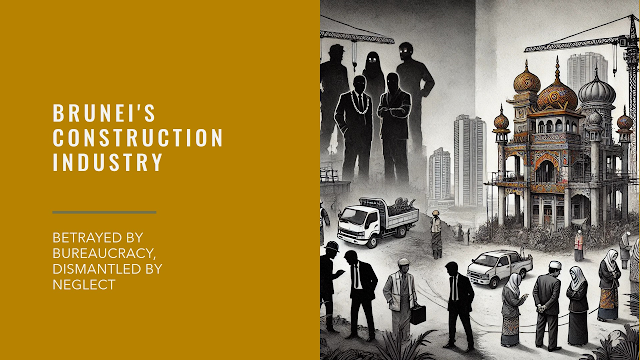"What happens when a nation’s dreams are built on broken foundations? Brunei’s construction industry, once a proud symbol of progress, now stands in ruins—abandoned projects, sidelined local talent, and rogue developers wreaking havoc on homebuyers. Behind every cracked facade lies a deeper story of neglect, exploitation, and lost identity. Are we witnessing the slow collapse of a nation’s vision?"
By DMAO and Malai Hassan Othman
BANDAR SERI BEGAWAN, DECEMBER 2024: Brunei’s construction industry, once a proud beacon of national identity and progress, is now a shameful reflection of systemic neglect and bureaucratic dysfunction.
Forty years after independence, the sector that should have been dominated by local talent and rooted in cultural pride is instead a breeding ground for unqualified expatriates, botched projects, and abandoned dreams.
The revelations from a recent closed-door meeting between Legislative Council members (MMN) and the Institution of Surveyors, Engineers, and Architects (PUJA) expose a crisis that cuts to the heart of Brunei’s aspirations.
It’s a damning indictment of a system that has failed its people, prioritising cost-cutting and convenience over quality, safety, and national pride.
Local Talent Abandoned, Foreign Workers Overrun the Industry
Where are Brunei’s homegrown architects, engineers, and planners?
Driven out by limited opportunities and stalled projects, local professionals—many of them graduates from Universiti Teknologi Brunei (UTB)—are sidelined while expatriates, some barely qualified, dominate the industry.
UTB graduates, lacking international accreditation, are forced to compete on an uneven playing field.
Unlike their peers in Malaysia and Singapore, who achieve Chartered status with ease, Bruneians face closed doors at home and abroad.
Many have no choice but to abandon their dreams or leave the country.
Meanwhile, unregulated expatriates have stepped in, claiming the lion’s share of opportunities.
“We’re losing our nation’s identity to foreign hands,” one disillusioned professional said.
“This isn’t just an oversight—it’s a betrayal.”
Design & Build: Cutting Corners, Killing Quality
The Design and Build (D&B) approach has become the industry’s default method, but instead of fostering innovation, it’s a disaster.
Contractors, given unchecked control, prioritise cost-cutting over quality, sidelining consultants who are supposed to ensure safety and integrity.
The results are everywhere: housing projects left to rot, public buildings devoid of cultural relevance, and a skyline that no longer tells Brunei’s story.
Buildings that once reflected Melayu Islam Beraja (MIB) values now resemble a “rojak” —a tasteless mix of architectural styles with no coherence.
Neighbouring countries, such as Malaysia, have shown how culturally inspired architecture can coexist with modernity.
Malaysia’s Putrajaya stands as a benchmark Brunei should aim to meet or exceed.
Systemic Inefficiencies and Vendor Bullying
Brunei’s tendering system compounds these issues by rewarding the lowest bid rather than quality.
Contractors cut corners, using substandard materials and unqualified labour to meet tight budgets.
Adding insult to injury, government project managers and executives have been accused of pressuring contractors and consultants into giving additional discounts under the guise of budget-saving exercises.
Affected vendors report withheld payments and forced terms that deviate from original agreements.
One consultant shared, “We completed our work on time and within specifications, yet they demanded discounts that weren’t part of the deal. It’s bullying, plain and simple.”
These coercive practices, combined with delays in project approvals that stretch into months or years, have deterred foreign investors and stifled local development.
Global investors accustomed to streamlined processes are bypassing Brunei for more predictable markets, further widening the gap between aspiration and reality.
Unregulated Developers: A Nightmare for Homebuyers
The housing sector has become a minefield for buyers. Rogue developers, operating with impunity, abandon projects, leaving families to shoulder loans for homes they’ll never live in.
Adding insult to injury, Qualified Persons (QPs) tasked with ensuring compliance are often scapegoated for developer failures.
This lack of accountability is a slap in the face to every Bruneian citizen.
A System in Freefall: What’s at Stake?
Brunei’s construction industry is not just in trouble—it’s in freefall.
Its inefficiencies, lack of oversight, and misplaced priorities betray the principles of self-reliance and cultural pride that underpin Wawasan 2035.
For Brunei to regain its competitive edge, it must emulate nations like Singapore, where streamlined processes and transparent systems attract global investors.
Singapore’s Building and Construction Authority (BCA) serves as a model, proving that efficiency and accountability can coexist in governance.
Reforms Needed Now
To salvage what’s left, Brunei must act immediately. The following reforms are non-negotiable:
1. Revise D&B Practices: Restrict this method to specialised projects and restore consultants’ authority over quality and cultural integrity.
2. Accredit UTB Programs: Achieve international recognition to empower Brunei’s graduates to compete globally and take leadership roles locally.
3. Streamline Bureaucracy: Implement technology to expedite approvals and rebuild investor confidence.
4. Regulate Developers: Enforce strict registration, financial checks, and penalties to protect homebuyers and ensure accountability.
5. Fix the Tendering System: Prioritize quality and sustainability over cost to safeguard public trust.
The Cost of Complacency
Brunei’s construction industry once stood as a proud testament to the nation’s values and aspirations. Today, it’s a cautionary tale of neglect, inefficiency, and misplaced priorities.
If these issues are not addressed, the consequences will be catastrophic—not just for the industry but for the very fabric of Brunei’s identity.
“We’re not just losing buildings—we’re losing who we are.”
The time for complacency is over. The time for action is now.
Disclaimer: This article is based on documents shared anonymously and aims to shed light on systemic issues without implicating specific organisations or individuals.


.jpeg)

